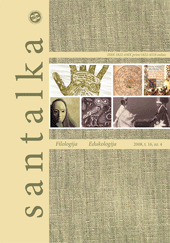Leksiniai prancūzų mokslo kalbos aspektai
Lexical Aspects of the Scientific French Language
Author(s): Lina Dubikaltytė-Raugalienė, Rūta Elžbieta KatalynaitėSubject(s): Language and Literature Studies
Published by: Vilnius Gediminas Technical University
Keywords: lexical approaches; terminological units; composite collocations and words; compound collections and words; polysemy; synonymity; stylistic features; neologisms.
Summary/Abstract: This article focuses on the analysis of lexical structures of specialized/technical literature in French. Thestudy proves that collocations and words are mainly perceived within the context. The essence of lexical approaches is syntactical connections between lexical units. Speciality vocabulary primarily performs denotative function. The analysis of lexical structure of technical and scientific language shows that semantic connections often prevail while choosing and organizing sets of vocabulary units. Meanings conveyed by lexical units are able to translate information only within the framework of syntactic construction. French terminology does not only consist of one-word terms, but it is also a set of compound and composite collocations and words, which are differentinsyntactic-semanticstructures.Continuous and discontinuous collocations are used, when immediate units are separated from each other and the boundaries are not clearly set. Collocations are composed by using methods of affixation and transposition and are of various length. Notably there are a lot of synonyms and polysematic words in terminological vocabulary. Recently the usage of anglicisms has become charactisistic in French speciality texts. Generally the vocabulary of special and technical literature is mostly logical and stylistically restrained, however figurativeness and expressiveness is also acceptable.
Journal: Santalka: Filologija, Edukologija
- Issue Year: 16/2008
- Issue No: 2
- Page Range: 47-56
- Page Count: 10
- Language: Lithuanian

